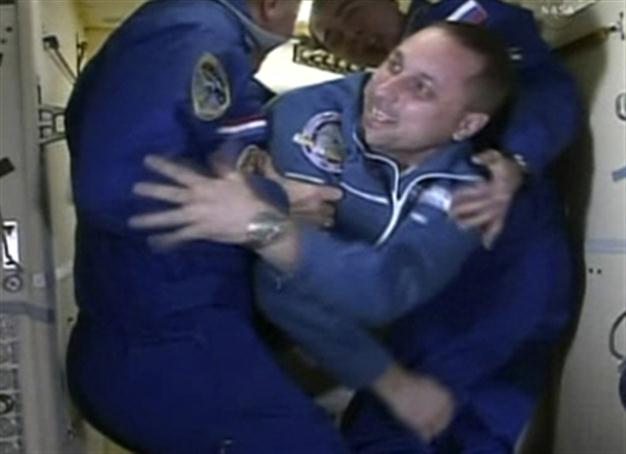Russian spacecraft delivers new crew to ISS
MOSCOW - Agence France-Presse

A spacecraft carrying two Russians and an American docked Wednesday with the International Space Station in the first Russian manned mission for five months after a spate of technical failures.
A spacecraft carrying two Russians and an American docked Wednesday with the International Space Station in the first Russian manned mission for five months after a spate of technical failures.
The glitch-free docking of the Soyuz TMA-22 came after a textbook launch on Monday and was a huge boost to Russia which postponed the mission in the wake of the disastrous crash of an unmanned supply ship bound for the ISS in August.
“The ship docked at 09:24 Moscow time (0524 GMT). Everything went ahead normally,” a Russian space agency spokesman told AFP.
“The process of the approach and docking was carried out in an automatic regime under the supervision of mission control centre and the crew,” Russia’s flight control centre outside Moscow said in a statement on its website.
The capsule was carrying American Dan Burbank and Russians Anton Shkaplerov and Anatoly Ivanishin, who joined the three crew currently on board the ISS.
The current ISS crew of American Mike Fossum, Japan’s Satoshi Furukawa and Russia’s Sergei Volkov will return to Earth on November 22 and a new crew will head up from Baikonur on December 21.
The Soyuz crew opened the hatch at 11.39 am Moscow time (0739 GMT), NASA said. Its website showed footage of the smiling astronauts floating in through the hatch from the Soyuz to hugs from their colleagues.
The men were set to enjoy their first meal together and then the new crewmates were to sleep to reset their body clocks.
“I’m glad finally to get aboard,” Burbank said via a video link with mission control, aired on NASA’s website. “It was a great ride up here and it’s going to be a great stay.”
Burbank is a veteran of two US shuttle missions to the ISS, while Shkaplerov and Ivanishin were making their first space flight.
The crew blasted off from the Baikonur cosmodrome in Kazakhstan on Monday in Russia’s first manned mission since June. The workhorse rockets had been grounded after the unmanned Progress supply ship crashed in August.
The Soyuz-U rocket that failed to take the Progress to orbit is closely related to the Soyuz-FG that is used for manned launches, prompting the temporary grounding of the entire arsenal of the Soyuz rockets.
The failed launch of the Progress cargo ship eroded faith in Russia’s status as a space superpower just as it had become the only nation capable of taking humans to the ISS after the retirement of the US shuttle in July.
It also forced a complete rejig of staffing for the ISS. The latest mission had been due to go up in September.
The Progress mishap was just the worst in a string of embarrassing technical failures with the Russian space programme.
As well as the Progress and possibly the Phobos-Grunt Mars probe, Russia has lost three navigation satellites, an advanced military satellite and a telecommunications satellite due to faulty launches in the past 12 months.
Phobos-Grunt was launched on November 9 on a mission to take a soil sample from a Martian moon but has failed to head out of Earth’s orbit on its course to the red planet.
The recent problems were a major disappointment for Russia in the year marking half a century since Yuri Gagarin made man’s first voyage into space from the same historic cosmodrome.
The Soyuz rocket design first flew in the late 1960s and has a proud safety record, with Russia boasting that its simplicity has allowed it to outlive the shuttle.
Whereas NASA endured the fatal loss of the Challenger and Columbia shuttles in 1986 and 2003, Moscow has not suffered a fatality in space since the crew of Soyuz-11 died in 1971 in their capsule when returning to Earth
















